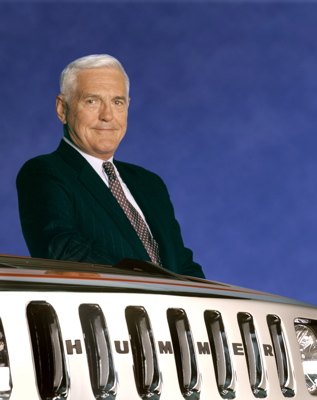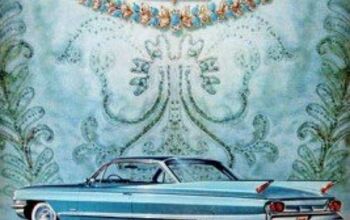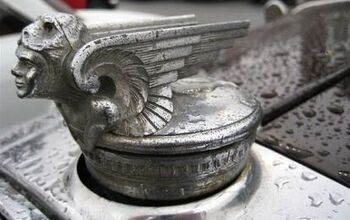Editorial: General Motors Death Watch 256: Clutch Players
The mainstream media tends to fumble the metaphorical football on the symbolic goal line. With fewer than twenty-four hours left before General Motors files for Chapter 11, the MSM is set to go back, Jack, and do it again. Instead of excoriating GM’s management for not taking in more money than they spent, they’re parsing the American automaker’s bankruptcy as a “sign of the times.” Leading this electronic charge of the heat without light brigade: P. J. O’Rourke. Writing for the Wall Street Journal, O’Rourke paints GM’s dissolution as confirmation that America’s love affair with the automobile is, finally, dead. Rubbish.
Quick digression: Yesterday, I was looking for something to healthy to eat at Six Flags New England. As you might imagine, I’d have had better luck trying to win an enormous Tweety Bird by tossing small plastic rings at the necks of custom-made, ring-aversive milk jugs. As I consumed a greasy hot dog on a butter infused bun, I thought, well, that’s the way it is.
If these teeming throngs wanted a healthy salad or a chilled fruit cup, Six Flags would sell them. The vast majority of their coaster-lovin’ customers want fried foods and sugary drinks. Six Flags has a business to run. So they give their customers what they want. Tough luck for me. The same inescapable economic logic applies to the manufacturers of P. J. O’Rourke’s diss-missed automotive “appliances.”
Contrary to the prosaic pistonhead’s rant, no one forced Americans out of their charismatic, high horsepower barges into boring and bland vehicles. Truth be told, the average consumer wanted personal transportation that they didn’t have to think about it. The automakers who best provided these vehicles thrived. The ones who could not do so, both consistently and profitably, did not.
It’s one of those ipso facto deals. If American car buyers didn’t place reliability above all, they’d still be driving union-built be-finned rust buckets that required constant mechanical attention. The fact that Toyota, Honda, Nissan and Hyundai are solvent, while GM is not, is a simple reflection of the transplanted automakers’ ability to give the people what they want.
Never mind the bailout or O’Rourke’s pining for more “adventurous” times. The free market has spoken. GM must die.
Was this desire for aesthetically neutral four-wheeled appliances nurture (roadside stranding, lousy dealer service, inconvenience and expense) or nature (if I wanted to be a mechanic I’d be one)?
O’Rourke blames suburban ennui (i.e., car as cupholder) and “busybodies of the environmentalist, new urbanist, utopian communitarian ilk.” He bemoans the end of the legacy of the swaggering, charisma-loving “romantic fools” who created America’s automotive giants. Yes, well, it was these self-same car guys that condemned GM to its ultimate fate as a tax-sucking zombie.
Former GM CFO and ex-CEO Rick Wagoner is [rightly] blamed for pissing away billions on ill-advised acquisitions. He merits condemnation for refusing to man-up and declare bankruptcy when the company could have done so under its own steam. And he deserves his place in infamy for handing the keys to the executive washroom to the federal government. Still, ultimately, the beancounters didn’t kill GM. The car guys did.
The car guys failed to commit the company to designing and building the small range of bland, reliable, competitive, cost-effective automotive products it needed to survive. They were drunk on pickups. High (and mighty) on SUVs. When it came to more pedestrian metal, GM’s senior (i.e., divisional) car guys threw whatever they had against the wall to see what would stick. Not much did, and they didn’t care.
Don’t tell me that Wagoner and his predecessors tied the car guys’ hands behind their backs, forcing them to accept badge-engineered mediocrity. They were happy enough to go along for the ride. And why not? They were hugely compensated cogs in a corporate culture where failure was impossible, gorging on unimaginable riches simply for keeping the status quo. Speaking of which . . .
It should never be forgotten that Car Czar Bob Lutz squandered GM’s last remaining chance at a genuine, product-led turnaround. Lutz doubled-down on a half-assed redesign of GM’s trucks, imported sales stinkers and commissioned poorly-developed niche-mobiles without a hope in hell of mass success. Lutz’ highly-touted Chevrolet Malibu was a singular vehicle; it was also too little too late.
Here’s the funny, horrible thing: you can hear echoes of Bob Lutz in O’Rourke’s paradise lost essay. Like Lutz, O’Rourke believes that American car culture is practically dead. Both men mistake the end of a certain kind of enthusiasm—their own—for a wider malaise. They don’t understand that automotive enthusiasts will always be a relatively insignificant minority of the American public; tens of millions of motorists want cheap, reliable, comfortable, practical, safe, not-too-thirsty, not-ugly transportation.
No one’s asking P. J. O’Rourke to respect appliance drivers. But GM’s inability to do so was, in the final analysis, the death of them.
More by Robert Farago
Latest Car Reviews
Read moreLatest Product Reviews
Read moreRecent Comments
- Kjhkjlhkjhkljh kljhjkhjklhkjh A prelude is a bad idea. There is already Acura with all the weird sport trims. This will not make back it's R&D money.
- Analoggrotto I don't see a red car here, how blazing stupid are you people?
- Redapple2 Love the wheels
- Redapple2 Good luck to them. They used to make great cars. 510. 240Z, Sentra SE-R. Maxima. Frontier.
- Joe65688619 Under Ghosn they went through the same short-term bottom-line thinking that GM did in the 80s/90s, and they have not recovered say, to their heyday in the 50s and 60s in terms of market share and innovation. Poor design decisions (a CVT in their front-wheel drive "4-Door Sports Car", model overlap in a poorly performing segment (they never needed the Altima AND the Maxima...what they needed was one vehicle with different drivetrain, including hybrid, to compete with the Accord/Camry, and decontenting their vehicles: My 2012 QX56 (I know, not a Nissan, but the same holds for the Armada) had power rear windows in the cargo area that could vent, a glass hatch on the back door that could be opened separate from the whole liftgate (in such a tall vehicle, kinda essential if you have it in a garage and want to load the trunk without having to open the garage door to make room for the lift gate), a nice driver's side folding armrest, and a few other quality-of-life details absent from my 2018 QX80. In a competitive market this attention to detai is can be the differentiator that sell cars. Now they are caught in the middle of the market, competing more with Hyundai and Kia and selling discounted vehicles near the same price points, but losing money on them. They invested also invested a lot in niche platforms. The Leaf was one of the first full EVs, but never really evolved. They misjudged the market - luxury EVs are selling, small budget models not so much. Variable compression engines offering little in terms of real-world power or tech, let a lot of complexity that is leading to higher failure rates. Aside from the Z and GT-R (low volume models), not much forced induction (whether your a fan or not, look at what Honda did with the CR-V and Acura RDX - same chassis, slap a turbo on it, make it nicer inside, and now you can sell it as a semi-premium brand with higher markup). That said, I do believe they retain the technical and engineering capability to do far better. About time management realized they need to make smarter investments and understand their markets better.


































Comments
Join the conversation
You used "Going-out-of-business-until-Renault-saved-our-asses" Nissan as a case of solvency? HA! Ok, so let me get this straight? It wasn't Red Ink Rick or other finance guys who ruined the car industry but the car guys who didn't do a good enough job standing up to their bosses? Heh, that's as absurd a concept as a truly free market (which doesn't exist but in economic fantasy land) that can actually dictate if GM dies or not. Besides, GMs real death knell is hideous debt and legacy costs. They still have shit loads of revenue coming in (even today after the bankruptcy/bail out drama) so that if they could get the cost part of revenue-cost=profit low enough they can make cash even selling one solitary car.